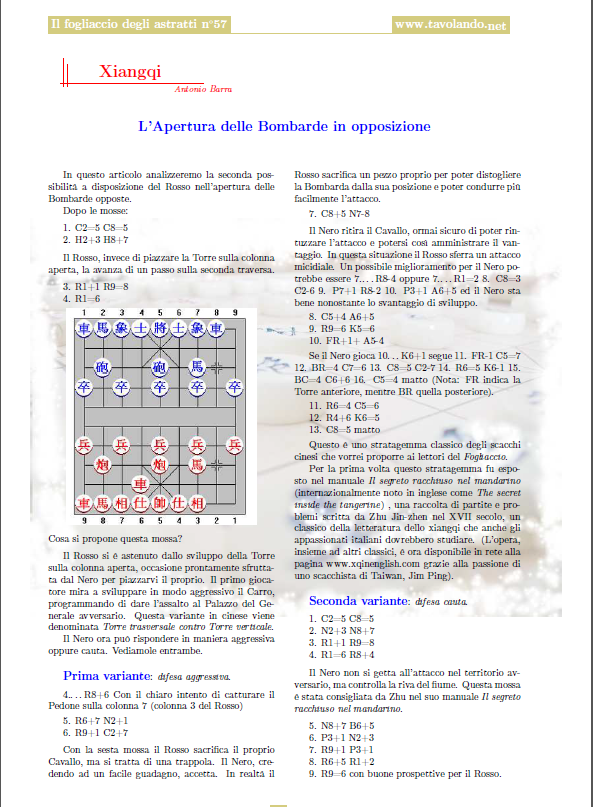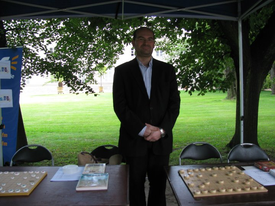Promoting Xiangqi (Chinese Chess), and interview with Antonio Barra
Author: Jim Png, Webmaster of www.xqinenglish.com
Note: This article first appeared in Xiangqi.com
Over the years of promoting over the internet, the Webmaster of www.xqinenglish.com has met with several fellow Xiangqi (Chinese Chess) enthusiasts from different parts of the globe. One of the earliest contacts that the Webmaster had was with Mr. Antonio Barra. Mr. Barra's work at promoting Xiangqi in Poland and Italy has been most impressive and has earned the Webmaster's utmost respect.

Diagram 1 Antonio Barra, Xiangqi Promoter Extraordinaire
The following is an insight into Xiangqi promotion in Poland, where Mr. Barra will share his thoughts, experiences, and insights into Xiangqi promotion in Europe.
Interview:
Jim:
Please give our readers a short introduction about yourself. Out of curiosity, what form of chess did you start learning?
Antonio:
I was born in Italy in 1972. I started with International Chess (IC) at the end of 1985 (Christmas).
Jim:
I know you have a strong affection for both Shogi and Janggi. It is fascinating to me how you came into contact with both forms of Chess. Can you share with us your encounters with Shogi and Janggi?
Antonio:
My first encounter with oriental games was from Japanese animation, Lupin the Third, to be specific. In the animation, I was introduced to both Shogi and Go. As for Janggi, I discovered the game in 2008 after the Shogi player Giuseppe Baggio introduced the game to me.
Jim:
What about Xiangqi? How did you become acquainted with the game?
Antonio:
I had discovered Xiangqi in 1992 when in the chess shop in Bologna, I met an Italian chess Candidate master who also liked Xiangqi. He gave me a photocopied edition of the fanzine "Xiangqi Mi Tong bao" edited by Agostino Guberti.
Successively in the Chess Club in Salerno, there was a guy who liked Oriental Chess too. In 1993, he gave me the articles about Shogi and Xiangqi published in an Italian magazine dedicated to Chess Variants ("Eteroscacco"). In this period, I wrote to Agostino Guberti to help him spread Xiangqi through the Chess Ligue of the UISP (Italian Union Sport for All, a sports union for amateurs). I was in the national council from 1991). Unfortunately, this project didn't catch the interest of UISP officials...
(Jim: The following is a link to an edition of Xiang Qi Mi Tong Bao that the Webmaster could find online:
https://www.pi.infn.it/~carosi/chess/xqmtb50.pdf )
Jim:
Out of curiosity, how strong are you in the different forms of Chess mentioned above?
Antonio:
My strength in Xiangqi and janggi: false beginner/pre-intermediate.
My strength in international Chess: I was a Category Two player (1993). Successively I started to play by email, and I was 2000 Elo.
Jim:
How or why has Xiangqi fascinated you? The gameplay, the tempo of the game? How would you compare it to Janggi and Shogi?
Xiangqi fascinated me because I was initially "chess-centric" but, I noticed that although rules were very similar, Xiangqi gameplay appears to be really rich and full of possibilities. And the early Chinese International Chess masters playing in Europe were also well acquainted with Xiangqi. Compared to Janggi and Shogi, Xiangqi is more "static." Still, I think the real force and charm of the Chinese system is in the middlegame (the combinations have really fascinating and poetic names!) and in the endgame (which is a real science as in the international chess!).
Jim:
What have you done for promoting Xiangqi?
Antonio:
I started promoting Xiangqi in Poland in 2008, Organizing activities (demos) and writing a blog in Polish, and some articles. I also had contacts for Xiangqi promotion with an event company that worked with Polish Lotto in 2009. Unfortunately, the results were very modest. People (especially youngsters) were more interested in Japanese Chess due to Japanese animations and popular culture.
(Note: Mr. Barra wrote two articles in Italian introducing the Same Direction Cannons. The magazine that he wrote was “Il fogliaccio degli astratti.” There were two articles in two different editions of the magazine. (1 pp. 46-48), (2).
In 2018, Mr. Barra also submitted a paper to the 2018 annual Hangzhou Chess Conference in China. His paper introduced the history of Xiangqi and its development in Italy, Russia, and Poland. The article he submitted was in English, but it was translated into Chinese, and the Chinese version can be reached at the following URL:
https://mp.weixin.qq.com/s/oSimiABWdI_D0R1_WDB31w )

Diagram 2 Snapshot of article written by Antonio Il Fogliaccio degli astratti
Jim:
What is Xiangqi like in Poland and Italy?
Antonio:
Unfortunately, in Poland, Xiangqi is not popular except in the Vietnamese and Chinese communities.
Interestingly, in 1958-59, a magazine was published by the Polish-Chinese Friendship Association that included a section for Xiangqi. The magazine also had some concourses of puzzles with solutions. But this game never had the good fortune in Poland.
In Italy, the situation is almost the same. Maybe in Milan and Prato (near Florence), the Chinese community has organized some Xiangqi events. But unfortunately, the rest of the country isn't covered.
Jim:
What is Xiangqi like to you on a national level?
Antonio:
In Poland, perhaps the best phrase to describe Xiangqi would be 'terra incognita.'
(Jim: Terra incognita is a term used in cartography for regions that have not been mapped or documented.)
Jim:
What is Xiangqi like in Europe?
Antonio:
In Europe, Xiangqi is strong in Germany and maybe in France. Very good things are happening in Belarus, where the local Chess and draughts club has opened a Xiangqi section thanks to the local Xiangqi enthusiasts with Sergey Korchitsky at the lead.
Jim:
What are some of the problems that non-Chinese players face when wanting to learn Xiangqi?
Antonio:
Indeed the ideograms on pieces, but this is not so a big issue, I think.
Jim:
What is needed to promote the game?
Antonio:
Maybe more people and a better image of China and the Chinese world. Everything Chinese is often related to Communist China. Due to the political situation in the world, the Chinese soft power (through dramas, technology products, and popular culture) is a lot weaker than the Japanese or South Korean influence on the Western popular culture.
Jim:
How do you introduce Xiangqi to your fellow Europeans?
Antonio:
First of all, I would introduce Xiangqi as a part of the very ancient Chinese culture that people still play today. And would show some interesting and spectacular ancient game, to demonstrate that is not a "geek" game with strange and eccentric rules. Role-Playing games are more complicated and expensive.
Jim:
What about specific activities, for example, organizing tournaments?
Antonio:
Yes, indeed. To make a game appealing such that progress can be made in promoting it, tournaments are needed.

Diagram 3 Promoting Xiangqi
Jim:
Are there learning materials readily available in Europe?
Antonio:
Of course, the same rules can't help. In Europe, excepting rare exceptions, there is not so much learning material about the game.
Jim:
What about Xiangqi sets?
Antonio:
Xiangqi sets? Yes, indeed. Xiangqi sets are rare, and we don't have a large offer of tournament sets.
Jim:
Are there places where you could meet other people playing Xiangqi? Or where do you gather to play Xiangqi?
Antonio:
Venues for playing Xiangqi? This is another problem. We can use cafes, but a real club is much better. This is another issue. Chess clubs could be a solution in order to guest us Xiangqi fans.
Jim:
What are the problems or interesting situations that you have faced when promoting Xiangqi?
Antonio:
Firstly, the great ignorance and prejudices that this game "is too difficult due to Chinese ideograms." Strangely I didn't see problems in playing Shogi. Why? Is Japan cooler?
Jim:
What do you think is needed to promote Xiangqi? How can we increase awareness of Xiangqi?
Antonio:
First of all, Xiangqi should be visible in media or popular culture. A good example would be the fact that Shogi can often be seen in Japanese pop culture.
Jim:
With regards to the Chinese culture and Xiangqi, what do you wish to see more?
Antonio:
Maybe it would be fine to show Xiangqi in Chinese life and history.
Jim:
Why?
Antonio:
In this way, it is possible to show that Xiangqi is more ancient than Chess and that this is a deep and fascinating game with millenary wisdom.
Jim:
Are there any things that that must be avoided when promoting Xiangqi?
Antonio:
Indeed, that Xiangqi and PRC government are strictly tied. In the West, China is identified chiefly with communism and now with Wuhan and the Covid...
Jim:
If we were to compare Xiangqi and Janggi promotion in Europe, what are your insights?
Antonio:
Janggi (Korean Chess) starting spreading in Europe in 2008. In 2019, it founded the European Janggi Federation. The game has good potential for an expansion (but Covid has blocked it). Xiangqi, for now, has a good position (In Germany and Belarus, in this last case, thanks to Sergey Korchitskij).
Jim:
As for Shogi, what do you think?
Antonio:
Surely Shogi has more fans thanks to the promotion of the game in Japanese popular culture (for example, many youngsters watched Shogi in the Japanese animation "Naruto").
Jim:
I would like to ask your opinion on some 'controversial' issues that I personally have met when promoting Xiangqi. Do you think that Chinese inscriptions on the chess pieces are an issue when promoting Xiangqi to non-Chinese speaking people?
Barra:
This is only an excuse and a pretext, I think. Shogi pieces have DOUBLE the number of ideograms, and this is not a problem at all...
Jim:
What about the use of three-dimensional pieces in promoting Xiangqi? Could there be any industrial implications?
Antonio:
I am not favorable: these adaptations are only a distortion of the actual game
rules.
Jim:
What are your thoughts on educating the next generation of Xiangqi players?
What do you think the aim/goal should be?
Antonio:
First of all, the young generation must have fun playing Xiangqi.
Jim:
What can be done or what should be done?
Barra:
I think here Xiangqi amateurs must cooperate with Chinese Institutions (for example, Confucius Institute, but also other local institutions and clubs)
Some Afterthoughts
At the beginning of 2010, the author started promoting Xiangqi in English. Over the years, the author has had many discussions with many non-Chinese enthusiasts about the state of affairs when promoting Xiangqi with a non-Chinese language.
From the interview, the author believes that a low profile is perhaps the most crucial reason why Xiangqi has not been promoted in Europe. It would appear, according to Antonio, that Chinese inscriptions and the fact that Xiangqi does not use three-dimensional pieces are NOT the reason why Xiangqi has not caught on.
Using Shogi and Janggi as comparisons, folks in Europe seem to be more aware of Japanese culture and less knowledgeable about the Chinese culture. Animations from Japan seem to have 'promoted' Shogi and Weiqi (Go) very well. Perhaps the 'soft power' of the Chinese culture is still lacking in that area.
The lack of interest by governing bodies seems to be another issue. On several occasions, Antonio has spoken to me about his efforts and zeal being given the cold shoulder by the governing bodies. The author believes that this may, in part, be due to the lack of understanding by these governing bodies, which would bring us back to the low profile of Xiangqi. As mentioned by Mr. Barra, world politics also seem to have deterred the promotion of Xiangqi. However, that would be beyond the scope of this article.
The lack of a group of locals focused on promoting Xiangqi would seem to be another serious issue. It is impossible, even with the internet, to promote Xiangqi alone. People are needed to organize tournaments, form clubs, organize Xiangqi gatherings or various activities.
Another recurrent issue that hindered the promotion of Xiangqi was the lack of study material in a language other than Chinese or Vietnamese. Such a deficiency was especially glaring. Non-Chinese/Vietnamese Xiangqi enthusiasts were interested in learning but did not know what to learn or where to go for information. Even to date, non-Chinese material on Xiangqi is still very lacking, and there are not many other people trying to promote the game in a language that is not Chinese.
It is the reason why the author has chosen to translate and share whatever he knew, in English, with the non-Chinese speaking peoples of the world.
The lack of understanding can be disastrous and seriously impede the introduction of Xiangqi, its culture, and history to the world.
There is still much work to be done, Antonio! Let's do it together!
For interested Xiangqi enthusiasts, please support the Polish Xiangqi Group and Italian Xiangqi Club on Facebook. They need all the support that they can get!
Polish Xiangqi Group: https://www.facebook.com/groups/1720664501575818
Italian Xiangqi Group:
https://www.facebook.com/groups/485728064947873
Works Cited
1. Barra, Antonio. Xiangqi. Il fogliaccio degli astratti. Numero 56- Anno 8, July 2011.
2. —. L'Apertura delle Bombarde in opposizione. Il fogliaccio degli astratti. 57, December 2011, Vol. 8, p. 53.
